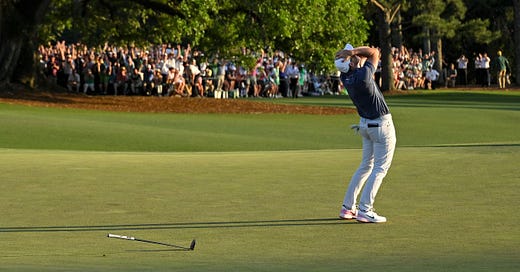The Masters tells sport one important message - less IS more
Sport is busy adding more and more when it's clear fans want less - just make it special
Some sports are stuck in a death spiral of incessant EVENTS that it becomes extremely difficult to discern the missable from the unmissable.
MLB and the NBA are the two most prominent examples around; the former has an astonishing 162 games in its regular season in a six month period, often with some on consecutive days. The NBA meanwhile has just ended its gruelling 82-game campaign, which in the last month has been defined by teams tanking as much as possible to be better prepared for next year with improved draft picks and options.
But while those sports are locked into TV deals that require their calendars to be long in order to fill in the scheduling gaps, NFL has always remained lean, with each team competing 17 times over an 18-week season building up to the playoffs.
And therefore, when the Superbowl comes around, it feels special, packed with heritage and culturally relevant.
And that’s what Rory McIlroy’s Masters victory last Sunday felt like. You have a generationally-talented megastar fulfilling his dreams in golf’s private amphitheatre, with more twists and turns than a scripted Hollywood movie. If you think an AI could have made this and retain this level of authenticity, think again.
But it’s less about this incarnation of the Masters, and more about the Masters itself. This weekend perennially hammers home the message of tradition and of vital importance. But it’s also enhances the right technology instead of the wrong technology; shot trackers, next-generation drone shots, swing deconstruction, and much more.
But fuck the bad tech. ‘LOCK your phone in THIS box, please. Our footage is better than anything your amateur hands and selfish posturing will ever create.’
And it’s perfect because of it. All of these elements converged to create one of the greatest sporting events of all time, let alone from a golfing perspective. And you won’t see that course until this time next year, when even casuals are intrigued to once again tune in to the action. It’s the perfect example of leaving the consumer wanting more - something that sport is increasingly forgetting.
Too much of an average thing?
Like NBA and MLB, other sports are trying to squeeze ever more juice out of the orange, rather than ring-fencing the moments that made them great. Football has been increasingly guilty of it - that’s how we’ve got a Club World Cup this summer that no-one asked for and no-one wants to broadcast.
And even the concept of the league season - arguably the most protected of all parts of football - is starting to feel a little antiquated and, well, weak. This Premier League campaign will end with a whimper, while PSG are champions in France and Bayern are effectively so in Germany. Is it still worth a premium price to watch a game that has no impact on anything?
But it’s not just them either. Formula 1 is, right now, experiencing the beginning of this fatigue. At the end of Bernie Ecclestone’s reign the calendar was restricted to a lean 18 races, whereas under the ownership of Liberty Media the desire has always been to expand the number of events and generate more revenue accordingly - we are now at 24.
But the racing itself just… lacks. There’s still plenty of competition, but not much in the way of a consistent narrative or drama. Many of the young drivers that have been added lack personality and resonance. Lewis Hamilton and Max Verstappen remain the biggest draws by a gigantic distance.
And the fact the races come so thick and fast - three in April, and another four in May - means that viewers can pick and choose what they engage with and know they can catchup on the narrative next time out. It’s not appointment-to-view TV any more.
Horse Racing is suffering from stretching Cheltenham to four days and diluting the quality of the races while continually ramping up the prices. Cricket has so many derivative versions now that it’s impossible for even in the know to keep up, with relentless t-20 league launches now dominating the space.
And everyone at corporate level wants more, more, more, more action, more content to sell, more athletes to pillage, more quality to dilute. It is literally the example of diminishing returns.
And we’ve got derivative, worse version of actual sports which think they are attracting a new ‘younger’ audience but almost certainly aren’t. Rather than making them special, we’re diluting them more, and no-one benefits from more of an average thing.
We’re entering almost certainly the worst content era in history. AI will dominate and game increasingly stupid algorithms stuffed down the throats of an increasingly docile and defeated audience. They’ve got all the shitty content they’ll ever need, on tap, constantly.
The way to stand apart is to literally be the opposite of this. Be something that only your sport, or your event, can be. That’s why even as the Masters asks patrons to part with their precious phones, the event has a bigger footprint than ever.





